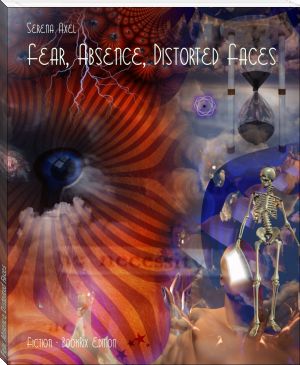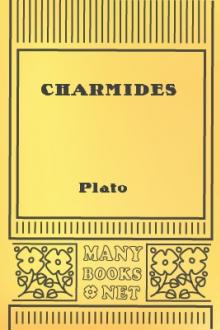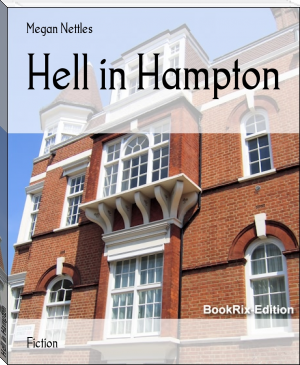The Smoky God - Willis George Emerson (english reading book TXT) 📗

- Author: Willis George Emerson
- Performer: -
Book online «The Smoky God - Willis George Emerson (english reading book TXT) 📗». Author Willis George Emerson
The winds were constantly blowing south, that is, they were blowing from the northern opening of the earth toward that which we knew to be south, but which, according to our compass’s pointing finger, was directly north.
For three days we tried to sail, and to beat against the wind, but to no avail. Whereupon my father said: “My son, to return by the same route as we came in is impossible at this time of year. I wonder why we did not think of this before. We have been here almost two and a half years; therefore, this is the season when the sun is beginning to shine in at the southern opening of the earth. The long cold night is on in the Spitzbergen country.”
“What shall we do?” I inquired.
“There is only one thing we can do,” my father replied, “and that is to go south.” Accordingly, he turned the craft about, gave it full reef, and started by the compass north but, in fact, directly south. The wind was strong, and we seemed to have struck a current that was running with remarkable swiftness in the same direction.
In just forty days we arrived at Delfi, a city we had visited in company with our guides Jules Galdea and his wife, near the mouth of the Gihon river. Here we stopped for two days, and were most hospitably entertained by the same people who had welcomed us on our former visit. We laid in some additional provisions and again set sail, following the needle due north.
On our outward trip we came through a narrow channel which appeared to be a separating body of water between two considerable bodies of land. There was a beautiful beach to our right, and we decided to reconnoiter. Casting anchor, we waded ashore to rest up for a day before continuing the outward hazardous undertaking. We built a fire and threw on some sticks of dry driftwood. While my father was walking along the shore, I prepared a tempting repast from supplies we had provided.
There was a mild, luminous light which my father said resulted from the sun shining in from the south aperture of the earth. That night we slept soundly, and awakened the next morning as refreshed as if we had been in our own beds at Stockholm.
After breakfast we started out on an inland tour of discovery, but had not gone far when we sighted some birds which we recognized at once as belonging to the penguin family.
They are flightless birds, but excellent swimmers and tremendous in size, with white breast, short wings, black head, and long peaked bills. They stand fully nine feet high. They looked at us with little surprise, and presently waddled, rather than walked, toward the water, and swam away in a northerly direction.[21]
[21 “The nights are never so dark at the Poles as in other regions, for the moon and stars seem to possess twice as much light and effulgence. In addition, there is a continuous light, the varied shades and play of which are amongst the strangest phenomena of nature.” — Rambrosson’s Astronomy.]
The events that occurred during the following hundred or more days beggar description. We were on an open and iceless sea. The month we reckoned to be November or December, and we knew the so-called South Pole was turned toward the sun. Therefore, when passing out and away from the internal electrical light of “The Smoky God” and its genial warmth, we would be met by the light and warmth of the sun, shining in through the south opening of the earth. We were not mistaken.[22]
[22 “The fact that gives the phenomenon of the polar aurora its greatest importance is that the earth becomes self-luminous; that, besides the light which as a planet is received from the central body, it shows a capability of sustaining a luminous process proper to itself.” — Humboldt.]
There were times when our little craft, driven by wind that was continuous and persistent, shot through the waters like an arrow. Indeed, had we encountered a hidden rock or obstacle, our little vessel would have been crushed into kindling-wood.
At last we were conscious that the atmosphere was growing decidedly colder, and, a few days later, icebergs were sighted far to the left. My father argued, and correctly, that the winds which filled our sails came from the warm climate “within.” The time of the year was certainly most auspicious for us to make our dash for the “outside” world and attempt to scud our fishing sloop through open channels of the frozen zone which surrounds the polar regions.
We were soon amid the icepacks, and how our little craft got through. the narrow channels and escaped being crushed I know not. The compass behaved in the same drunken and unreliable fashion in passing over the southern curve or edge of the earth’s shell as it had done on our inbound trip at the northern entrance. It gyrated, dipped and seemed like a thing possessed.[23]
[23 Captain Sabine, on page 105 in “Voyages in the Arctic Regions,” says: “The geographical determination of the direction and intensity of the magnetic forces at different points of the earth’s surface has been regarded as an object worthy of especial research. To examine in different parts of the globe, the declination, inclination and intensity of the magnetic force, and their periodical and secular variations, and mutual relations and dependencies could be duly investigated only in fixed magnetical observatories.”]
One day as I was lazily looking over the sloop’s side into the clear waters, my father shouted: “Breakers ahead!” Looking up, I saw through a lifting mist a white object that towered several hundred feet high, completely shutting off our advance. We lowered sail immediately, and none too soon. In a moment we found ourselves wedged between two monstrous icebergs. Each was crowding and grinding against its fellow mountain of ice. They were like two gods of war contending for supremacy. We were greatly alarmed. Indeed, we were between the lines of a battle royal; the sonorous thunder of the grinding ice was like the continued volleys of artillery. Blocks of ice larger than a house were frequently lifted up a hundred feet by the mighty force of lateral pressure; they would shudder and rock to and fro for a few seconds, then come crashing down with a deafening roar, and disappear in the foaming waters. Thus, for more than two hours, the contest of the icy giants continued.
It seemed as if the end had come. The ice pressure was terrific, and while we were not caught in the dangerous part of the jam, and were safe for the time being, yet the heaving and rending of tons of ice as it fell splashing here and there into the watery depths filled us with shaking fear.
Finally, to our great joy, the grinding of the ice ceased, and within a few hours the great mass slowly divided, and, as if an act of Providence had been performed, right before us lay an open channel. Should we venture with our little craft into this opening? If the pressure came on again, our little sloop as well as ourselves would be crushed into nothingness. We decided to take the chance, and, accordingly, hoisted our sail to a favoring breeze, and soon started out like a race-horse, running the gauntlet of this unknown narrow channel of open water.
FOR the next forty-five days our time was employed in dodging icebergs and hunting channels; indeed, had we not been favored with a strong south wind and a small boat, I doubt if this story could have ever been given to the world.
At last, there came a morning when my father said: “My son, I think we are to see home. We are almost through the ice. See! the open water lies before us.”
However, there were a few icebergs that had floated far northward into the open water still ahead of us on either side, stretching away for many miles. Directly in front of us, and by the compass, which had now righted itself, due north, there was an open sea.
“What a wonderful story we have to tell to the people of Stockholm,” continued my father, while a look of pardonable elation lighted up his honest face. “And think of the gold nuggets stowed away in the hold!”
I spoke kind words of praise to my father, not alone for his fortitude and endurance, but also for his courageous daring as a discoverer, and for having made the voyage that now promised a successful end. I was grateful, too, that he had gathered the wealth of gold we were carrying home.
While congratulating ourselves on the goodly supply of provisions and water we still had on hand, and on the dangers we had escaped, we were startled by hearing a most terrific explosion, caused by the tearing apart of a huge mountain of ice. It was a deafening roar like the firing of a thousand cannon. We were sailing at the time with great speed, and happened to be near a monstrous iceberg which to all appearances was as immovable as a rockbound island. It seemed, however, that the iceberg had split and was breaking apart, whereupon the balance of the monster along which we were sailing was destroyed, and it began dipping from us. My father quickly anticipated the danger before I realized its awful possibilities. The iceberg extended down into the water many hundreds of feet, and, as it tipped over, the portion coming up out of the water caught our fishing-craft like a lever on a fulcrum, and threw it into the air as if it had been a foot-ball.
Our boat fell back on the iceberg, that by this time had changed the side next to us for the top. My father was still in the boat, having become entangled in the rigging, while I was thrown some twenty feet away.
I quickly scrambled to my feet and shouted to my father, who answered: “All is well.” Just then a realization dawned upon me. Horror upon horror! The blood froze in my veins. The iceberg was still in motion, and its great weight and force in toppling over would cause it to submerge temporarily. I fully realized what a sucking maelstrom it would produce amid the worlds of water on every side. They would rush into the depression in all their fury, like white-fanged wolves eager for human prey.
In this supreme moment of mental anguish, I remember glancing at our boat, which was lying on its side, and wondering if it could possibly right itself, and if my father could escape. Was this the end of our struggles and adventures? Was this death? All these questions flashed through my mind in the fraction of a second, and a moment later I was engaged in a life and death struggle. The ponderous monolith of ice sank below the surface, and the frigid waters gurgled around me in frenzied anger. I was in a saucer, with the waters pouring in on every side. A moment more and I lost consciousness.
When I partially recovered my senses, and roused from the swoon of a half-drowned man, I found myself wet, stiff, and almost frozen, lying on the iceberg. But there was no sign of my father or of our little





Comments (0)